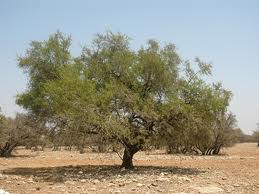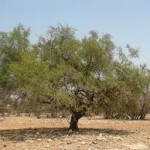by TomJackson
VENTURES AFRICA – A Moroccan university professor’s interest in the economic preservation of the declining Argan tree has resulted in women harvesting the tree’s valuable oil increasing their income by more than ten times.
The Argan tree is an ancient species that formerly spanned most of North Africa, but due to over-harvesting for timber and livestock grazing has seen its range limited to southwestern Morocco. The trees produce nuts, which in turn contain almond-shaped pods which, when crushed and processed, yield oil that is valued for its taste and flavour across Morocco. This rare Argan oil is used in couscous, salads and for dipping breads. Rich in vitamin E, phenols and caratenes, it is also used to treat skin conditions and has recently found favour in the cosmetics industry.
Zoubida Charrouf, a professor at Mohamed V. University in Morocco, initially developed an interest in the tree and its oil for conservation reasons, but has since improved the extraction of oil by establishing processing cooperatives – such as the Ajddigue and Taitmatine cooperatives – run entirely by local women. This commercialisation of Argan oil has boosted business in the cooperatives and emancipated the women by offering them a meaningful livelihood. Charrouf says that Argan Oil “should readily find a place of choice amid the most profitable oils for human health”. Celebrities as diverse as Sophie Dahl, model and writer, and Heston Blumenthal, one of Britain’s leading chefs, are fans.
The commercialisation was achieved by mechanising some of the tedious production tasks, such as grinding the nuts and pressing the oil. This sped up the operation and also improved the quality of the oil, doubled its shelf life, and reduced waste. Membership in the cooperatives now ranges from 35 to 40 women, who now earn about $8.60 a day, an increase of more than ten times from when the projects began in 1997. Argan oil is now a high value niche product on the international market, and what began as a cottage industry could now provide more employment to Moroccan women.
”At the time [the project started], we were losing more than 600 hectares of Argan forest each year,” says Charrouf. “But we also wanted to convert this ecological problem into an economic opportunity. I knocked at several doors, but no one believed in my project. Now Argan oil is known around the world.” The economic opportunity that Charrouf uncovered for Moroccan women is now being supported with grants from the Moroccan government and the European Union.
“Being part of the cooperative freed me from tedious domestic work in people’s homes,” said one member of the Taitmatine cooperative. “Now I’m learning to read and write and I’ve learned how to ensure the quality of the Argan kernels. The cooperative has made me more independent. I’ve been able to visit other cooperatives in other provinces. I’ve seen how girls and women like me have been able to shape their own destiny and move ahead to develop their cooperatives.”








